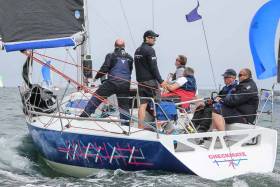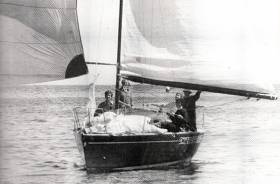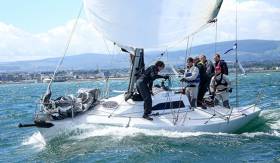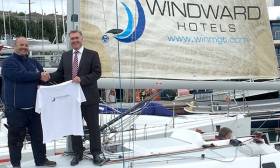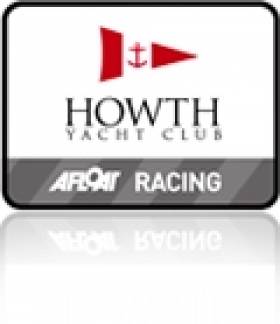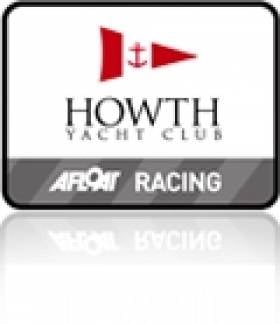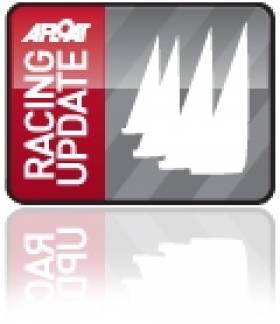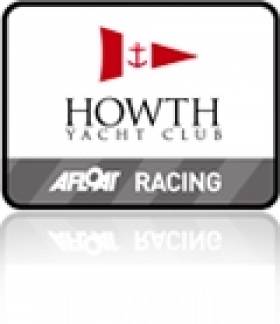Displaying items by tag: Dave Cullen
Q – What is 18 + 15? A – XX of course! The arrival of a new First 50, Checkmate XX into Howth Yacht Club will see the crews of Nigel Biggs’ Checkmate XVIII joining forces with Dave Cullen’s Checkmate XV crew.
Biggs and Cullen first sailed together on John Biggs’ MGRS34 Checkmate over 30 years ago and they have been lifelong friends ever since racing together on various boats. More recently, Biggs’ interest in racing half tonners was contagious with the two friends racing against each other for the last few years on the two Checkmates.
As they came out of the pandemic, both realised that age was "rapidly catching up with them" and that perhaps the time had come "to sail something with a few more creature comforts and a proper tea set".
While Nigel’s Checkmate XVIII has found a new owner in Howth, Cullen is keeping Checkmate XV where he will try to retain his title at the Half Ton Cup in Cowes in August, whilst the crews will race separately at the forthcoming WAVE regatta in Howth before they come together for a number of events, including the Round Ireland, Kingstown/Queenstown, ISORA, Cork Week and of course Greystones Regatta amongst others.
Nigel Biggs commented “Covid has highlighted the importance of making the most out of each day and the privileged lives we have. There is little better than being able to share these experiences with lifelong friends. I look forward to continuing to help Dave learn about the sport I love and live in hope that one day he may eventually be able to call himself a sailor too.”
Recently appointed ICRA Commodore, Cullen commented “I have spent many years weaning Nigel over to the Irish way of doing things and look forward to sailing together for many more years to come! He is a great advocate and reminder that you should always sail with someone worse than you to make you look better. He frequently reminds that sailing with your friends is a far better prize than any trophy on a cabinet (although he does actually have a few of those)!”
Afloat predicts the banter will continue…
Howth's Dave Cullen is Sailor of the Month for June
Howth’s Dave Cullen is “Sailor of the Month” for June after a stellar series of performances with his classic Half Tonner Checkmate XV. He emerged as clear overall champion in Howth’s successful Wave Regatta at the beginning of the month, and then went on to record outright class wins in both the National and Royal Irish Yacht Club Regattas. See those respective regatta reports here and here.
A skilled helmsman himself, Cullen is noted for his ability to provide impressive standards in boat management programmes, and top-level personnel resources with the likes of Nin O’Leary, Maurice Prof O’Connell and Mark Mansfield readily joining the Cullen crew lineup.
Half Tonners Hit The Spot for Irish Sailing
With the confirmation that Kinsale Yacht Club will be hosting the Half Ton Classic Worlds from August 14th to 18th 2017, Irish interest will intensify further in a class which already attracts much favourable attention. W M Nixon tells us more about a popular boat type which will have a defending champion from Ireland when the Worlds get under way in Falmouth in Cornwall in a week’s time.
If today’s newcomers to sailing find the resurrection of old offshore racing classes which are apparently only identified by specific weights a bit bewildering, then they can blame the first Commodore of the National Yacht Club in Dun Laoghaire.
The first Commodore of the NYC in 1931 was the Earl of Granard. The club had been founded in 1870 as the Kingstown Royal Harbour Boat Club, and in 1901 it became the Edward Yacht Club in honour of one of Queen Victoria’s many offspring. But with the new mood of the times after Irish Independence in 1922, such a name just wouldn’t do. Nevertheless it was a very sporting gesture when one of the landed aristocracy proposed the new no-nonsense name in 1930, giving it a fair wind by agreeing to be Commodore the following year.
Thus the big change to becoming “The National Yacht Club” was made respectable. But then, the Earl of Granard was a well-respected sailing man in his own right, despite the fact that his ancestral pile in County Longford was about as far from the sea as you can get in Ireland.
Admittedly there was sailing nearby with the North Shannon Yacht Club on Lough Forbes, which incidentally is named after the earl’s family – they were connected to the Forbes of the famous business magazine in America. However, despite the joys of sailing on Lough Forbes, the Earl had long been into bigger things on the international scene, though his interest still had an inland waterways aspect. In 1899 he’d presented a magnificent silver cup to the leading French sailing club, the Cercle de la Voile de Paris (CVP) for an international competition, to be sailed on the River Seine near Paris or on the Solent at Cowes, with the racing between boats which weighed one ton.
Although the trophy’s official name was the Coupe Internationale du Cercle de la Voile de Paris, it soon became known as the One Ton Cup, and continued to be so named even when racing was between yachts of the International 6 Metre Class, despite their weighing several tons apiece.
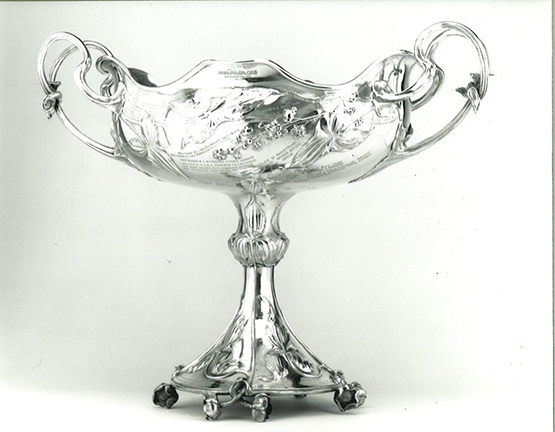 The cause of all the trouble – the One Ton Cup was presented to the CVP by the Earl of Granard, future Commodore of the National YC, in 1898, and was first raced for in 1899.
The cause of all the trouble – the One Ton Cup was presented to the CVP by the Earl of Granard, future Commodore of the National YC, in 1898, and was first raced for in 1899.
The magnificent cup remained as beautiful as ever, but with World War II it became almost forgotten until 1965, when the CVP proposed using it for an inshore-offshore international series for yachts rating at 22ft under the RORC rule, which worked out to be boats around the 36-37ft mark. The idea took off like a rocket - level-rating racing among diverse boats was an idea whose time had come. Very quickly, a whole range of additional international rating levels arose, with Two Tonners around 40-42ft, Three Quarter Tonners around 34ft, Half Tonners around 30ft, Quarter Tonners around 25ft, Mini-Tonners around 21ft, and they even had Micro-Tonners at about 18ft.
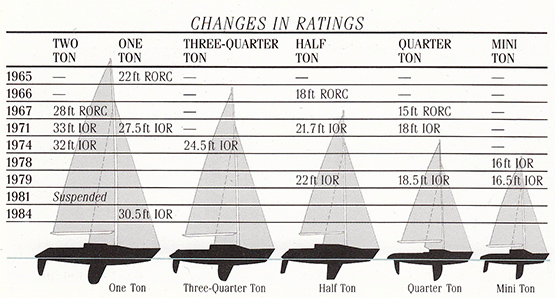 The Ton Classes at their peak
The Ton Classes at their peak
It all worked very well for twenty years and more in some cases (the last Half Tonner was built in 1992), with the boat sizes staying broadly the same size range, but with the ratings changed to accommodate the RORC rule being replaced by the IOR. And Irish sailing certainly had its moments in this continuing circus of various offshore racing acts. In 1974 the Ron Holland-designed, Cork–built 36ft Golden Apple somehow became more famous than the winner by being runner up the One Ton Worlds. But then in 1976, Harold Cudmore and a youthful crew from Cork put all questions aside by managing to get the new race-prepared Ron Holland-designed 30ft Silver Shamrock to Trieste for the Half Ton Worlds, and he won in style, famously celebrating by sailing up the Grand Canal in Venice with spinnaker set.
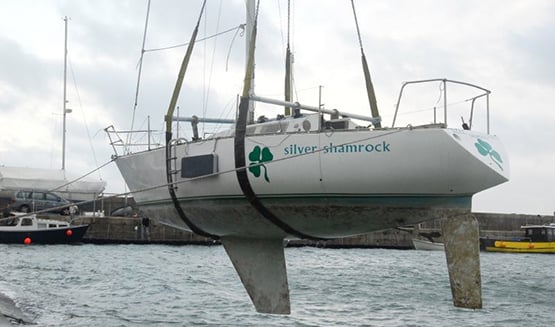 The 1976 Half Ton World champion Silver Shamrock, getting an end-of-season lift-out at her current home port of Penzance in Cornwall
The 1976 Half Ton World champion Silver Shamrock, getting an end-of-season lift-out at her current home port of Penzance in Cornwall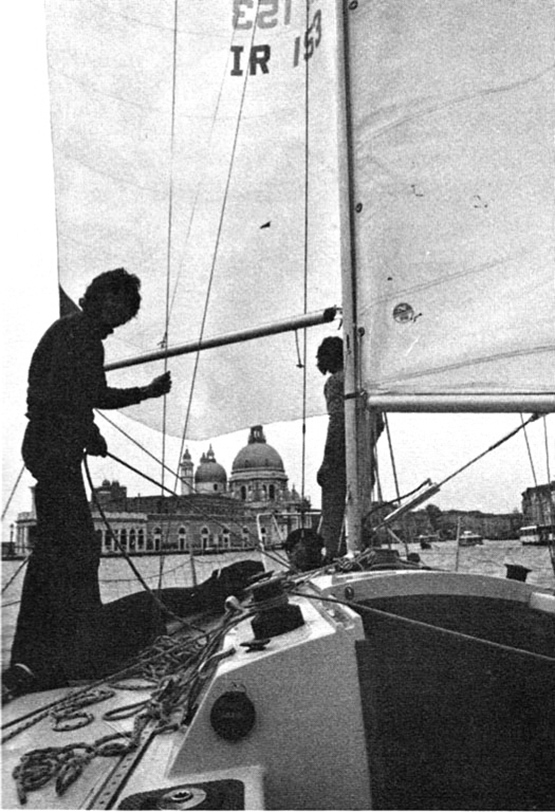 See the conquering heroes come…….Silver Shamrock sailing up the Grand Canal in Venice after winning the Half Ton Worlds 1976 in Trieste under Harold Cudmore’s command. Ronnie Dunphy on left, Killian Bushe on foredeck
See the conquering heroes come…….Silver Shamrock sailing up the Grand Canal in Venice after winning the Half Ton Worlds 1976 in Trieste under Harold Cudmore’s command. Ronnie Dunphy on left, Killian Bushe on foredeck
In 1981 he was back on top again, winning the One Ton Worlds at Crosshaven with the Castro-design Justine IV owned by Frank Woods (NYC). But by this time the boats involved were very different in form from those skinny-sterned designs which had dominated in the earlier 1970s, as a fresh wave of New Zealand designers like Bruce Farr and Laurie Davidson had been showing what could be achieved with broader sterns and better offwind performance.
The Half Ton Worlds was won in 1977, ’78 and ’79 by Kiwi boats of this type. But though she was not the overall winner, Ian Gibbs’ Farr-designed Swuzzlebubble was the one everyone remembered best, as she was on the podium one year as a centreboarder, and back there in the top three the year after, but this time as a keelboat.
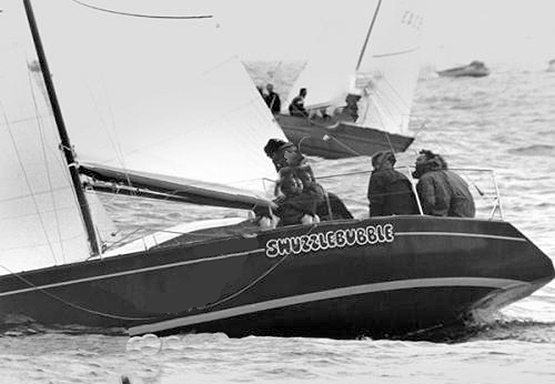 The new wave arrives from New Zealand – Swuzzlebubble in 1979
The new wave arrives from New Zealand – Swuzzlebubble in 1979
The following year she arrived in Ireland in the ownership of Bruce Lyster of Royal St George in Dun Laoghaire, and he won the ISORA Championship in 1980, plus ISORA Week and just about everything for which the boat was eligible in Cowes Week.
He had an exceptional crew of all the talents with Robert Dix, Drewry Pearson and Des Cummins, and Dixie remembers her as one of the most wonderful boats he ever sailed: “She found her own way to peak performance so effortlessly that you’d almost be scared to do anything which might adversely effect the trim” he quips.
He continues to say that even though Bruce Lyster sold Swuzzlebubble to Greece at season’s end, as you simply couldn’t improve on a season like they’d had in 1980. The Three Musketeers meanwhile transferred aboard Ken Rohan’s 40ft Regardless, with which they won their class big time in the 1981 Fastnet.
Regardless would be on most people’s short list for the greatest Irish racing yacht ever, yet Robert Dix remembers the previous season with Swuzzlebubble with even more enthusiasm. So it’s intriguing that at next week’s Henri Lloyd Half Ton Classics Worlds, the new wave of Irish Classic Half Ton sailors will be taking on Swuzzlebubble for the first time.
The story of her re-birth is typical of the modern revival of the very best of the old Ton Cup boats, with the One Ton Championship itself being revived for its Golden Jubilee in New Zealand in 2015 with a classic fleet. As for Swuzzlebubble, she was discovered in a very poor way indeed in a Greek boatyard in 2012, but was brought back to life by the King of Cowes, Peter Morton, who duly won the Half Ton Classics Worlds in Brittany in 2014 with her.
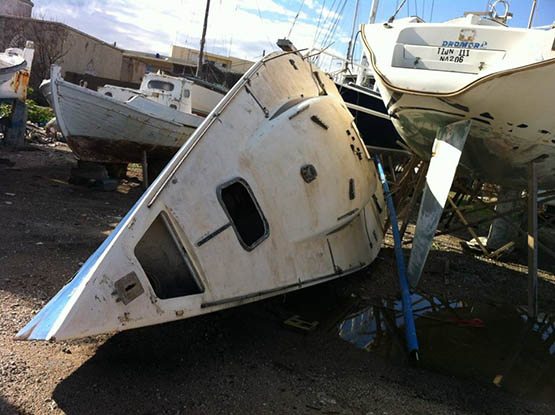 Next stop, the landfill site? Swuzzlebubble as she was found in Greece in 2012
Next stop, the landfill site? Swuzzlebubble as she was found in Greece in 2012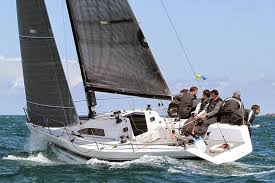 Swuzzlebubble restored, on her way to winning the Half Ton Classics in Brittany in 2014
Swuzzlebubble restored, on her way to winning the Half Ton Classics in Brittany in 2014
However, Swuzzlebubble wasn’t campaigned in the 2015 series in Belgium, when Dave Cullen took the trophy for Ireland with Checkmate XV. So there has been an air of unfinished business about these two rather special boats floating about the ocean without actually locking horns, but that’s all going to be changed in Falmouth.
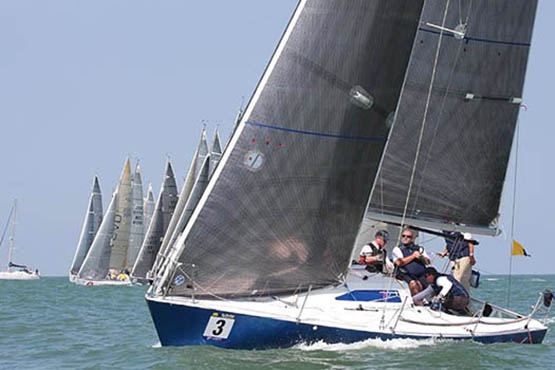 Dave Cullen on the helm as Checkmate XV makes a start to die for at the Half Ton Worlds in Belgium, 2015
Dave Cullen on the helm as Checkmate XV makes a start to die for at the Half Ton Worlds in Belgium, 2015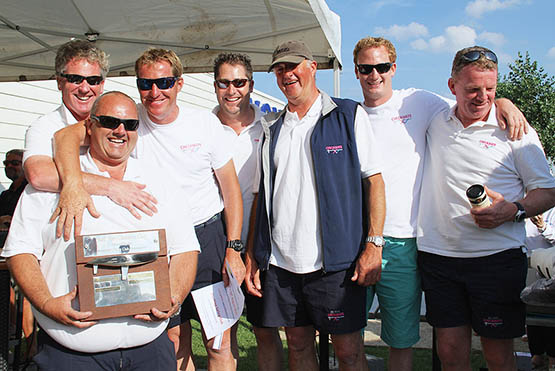 Winners take all – Dave Cullen and his crew with the trophy after victory last year
Winners take all – Dave Cullen and his crew with the trophy after victory last year
In fact, it has become Howth versus Falmouth, as Swuzzlebubble is now Falmouth-owned by Gregory Peck who, in a very varied sailing career, was one of the crew with Dickie Gomes aboard the 83ft catamaran Novanet when a new Round Ireland Record was established in November 1986, but that’s another story altogether.
However, in Falmouth there’ll be other boats involved too, as the word is they might muster as many as 30 entries, which is as big a fleet as anyone could reasonably wish for. The remarkable Howth/Fingal contingent will be there in full strength, as Checkmate XV will be taking the road with Jonny Swann’s Harmony, Michael and Richard Evans’ The Big Picture, and the David Kelly and Patrick Boardman team from Rush SC with King One, Half Ton World Champion in 1981.
It’s an intriguing mixture of nostalgia and modernity, as the boats get revamped to new ideas, yet they always carry their history lightly but definitely with them. In the case of the Howth boats, much of the technical work in revamping is done by ace boatbuilder Alan Power of Malahide, who appropriately is a powerboat nut himself, but his ability to think outside the usual boat-building box makes him the ideal man to undertake crazy notions for addicts of old but still potent offshore racers.
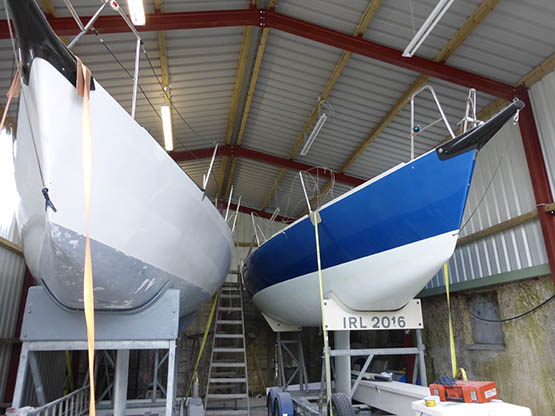
In line with this aim of maximising performance, the Howth/Fingal crewing lineup will include some formidable talent from all over Ireland, with Dave Cullen leading the charge with his 2015 crew of Johnny Murphy, Gary Cullen (no relation), Aidan Beggan, Mark Pettit, James Hynes and Andy George.
The crew on The Big Picture meanwhile have roped in Mark Mansfield of Cork, who is having a great year of it in a variety of boats, while the jockey for King One is young Marty O’Leary, one of the bright new talents to emerge in recent years from Courtown in County Wexford.
Down Falmouth way, it’s going to be Classic Half Ton Racing at its classic best. And if you wonder why it is that the Half Tonners seem to have been the most successful of all the Ton classes in reviving themselves after more than fifty years, perhaps the answer is that at 30ft they’re big enough as boats to be taken seriously, yet small enough to be a manageable proposition for keeping in top order and raced keenly.
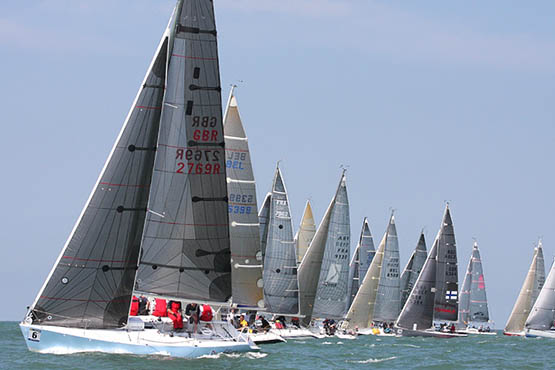 The contemporary Half Ton Classics lineup – the boats are big enough to be taken seriously, yet small enough to be manageable
The contemporary Half Ton Classics lineup – the boats are big enough to be taken seriously, yet small enough to be manageable
With the start of the Henri Lloyd Half Ton Classics Cup 2016 fast approaching on Monday 15 August the Half Ton Classics and the town of Falmouth are in the final stages of preparation for what promises to be a bumper edition of this delightful annual event. With at least 30 teams expected to travel to Falmouth from across the UK, Ireland and Europe, competition will be fierce as these historic little ships do battle against the spectacular backdrop of the Cornish coastline.
Among those already entered is Ireland's David Cullen, who won the 2015 Half Ton Classics Cup and will be back to defend his title in his 1985 Humphreys MG HS30 Checkmate XV. Originally named Blue Chip, the boat was purchased by Nigel Biggs in 2012 who put the boat through a major refit with Corby Yachts. David purchased her from Nigel over the winter of 2014/15 and she once again went into Corby Yachts, this time to have a new cockpit and transom fitted. At the time his 2015 victory David noted "It's a very tricky boat. The new boats are very powerful and we're still trying to figure it out. But we've learnt a lot this week and we look forward to moving forward and maybe being a little bit faster for Falmouth next year." With another year of sailing the boat under their belts since then it will be interesting to see if they are that little bit faster.
Also making the trip from Ireland for the event are Jonny Swan with Harmony, which was built by Priors of Burnham in 1980 to a Rob Humphreys' design for Mike Holmes and Tony Allen (of Holt-Allen fame) and is widely regarded as one of the most successful Half Tonners ever built. Kelly Boardman from Howth is racing King 1, which was previously owned by Cullen and Michael and Richard Evans will be competing in their Humphreys MG30 Big Picture.
Belgium will be putting forward several strong teams led by Philippe Pilate's 1978 Berret designed General Tapioca which won the 2009 Half Ton Classics Cup in Nieuwpoort, but broke their mast during the 2015 event so will be hoping for better luck this year. Also coming from Belgium are Ian Van Burm's 1983 Humphreys one off Fantasy and Thibaut Martin's MG HS30 Spip.
Heading up the British contingent will be 2014 Half Ton Classics Cup winner Peter Morton's 1977 Bruce Farr designed Swuzzlebubble which will be helmed by Greg Peck. Peter Rutter has entered his recently purchased 1985 Andrieu designed Insatiable, which has been renamed Quokka 9. From the East Coast come Anthony Meehan and Jane Mardell's Lynx and David Evan's Hullabaloo XV.
There will also be a strong showing from the local Falmouth Half Ton fleet with entries from Paul Pullen's Miss Whiplash, Mel Sharp's Demolition, John Hicks' Rampage, Geoff Davies' Scorpion and Jonathan Cunliffe's legendary Emiliano Zapata.
As well as racing in the event Paul Pullen is also a key player on the oganising committee and is very much looking forward to welcoming such a strong fleet of half tonners to his home town. "We have been working and training very hard this year, we are really looking forward to sailing against all the top boats in our own back yard. We're lucky to have some of Europe's best sailing waters right on our doorstep and with the experience, enthusiasm and commitment of Flushing Sailing Club and our local team of volunteers and sponsors behind us it's going to be a fantastic event."
The Henri Lloyd Half Ton Classics Cup 2016 is being hosted by Flushing Sailing Club and registration for the regatta opens on Saturday 13 August and continues on Sunday 14 August. Monday will feature a practice race followed by windward leeward races. From Tuesday to Friday the fleet will sail a mixture of windward leeward, regatta and coastal courses. Inshore races will be run in Falmouth Bay or Carrick Roads and the coastal race will be run within a 10-mile radius of Black Rock Beacon.
The boats will be moored at Pendennis Marina with the Regatta marquee located on Falmouth's Event Square, adjacent to the National Maritime Museum of Cornwall. An extensive social programme for competitors and their friends and families will center around Flushing Sailing Club, the Regatta marquee and the Museum, which will host the Championship Dinner.
A Round Ireland Race J/109 crew consisting of six national champions from three classes from last weekend's ICRA championships at Howth Yacht Club is setting its sights high for Saturday's race start.
The well known Howth based J/109 Storm has been chartered for the 700–mile circumnavigation and rebadged as 'Euro Car Parks'. The entry is skippered by ICRA class two champion Dave Cullen from the half–tonner Checkmate V.
Cullen's crew line up is: Mark Mansfield (currently at the Quarter Ton Cup in Cowes), Maurice O’Connell, John Murphy, Eddie Bourke, Aidan Beggan, Franz Rotschild and Gary Murphy.
As a further boost to race hopes, last night Cullen's campaign announced Windward Hotels as a 'major sponsor'.
Windward Management is one of Ireland's leading hotel operators owning and managing hotels both in here and abroad. The company has just completed the purchase of the Hilton Dublin Airport Hotel.
Euro Car Parks joins a fleet of 65 boats, nearly double the 2014 entry, for Saturday's Round Ireland start off Wicklow at 1pm.
#hyc – Competitors at the Key Capital Spring Warmer series in Howth Yacht Club were treated to glorious sunshine on the opening weekend of the season but unfortunately for all, the wind gods weren't as generous writes Daragh Sheridan.
In Race 1 in Class 2's Dave Cullen's beautifully turned out Checkmate got off to a winning start from Maximus in second and K1 in third.
The SB20 fleet was led from start to finish by Michael O'Connor in Sin Bin despite a great second beat by Ger Dempsey on Venues World. The podium was completed by Jerry Dowling's Bad Kilcullen.
The J24 fleet had shown great commitment in getting entries from as far afield as Sligo, Carrickfergus and Lough Ree. It was a dominant performance by Steve Atkinson in Bad winning both races with Martin Reilly's Crazyhorse and Finbarr Ryan taking a second a third place in each of the two races.
Local Squib guru Fergus O'Kelly heads the fleet with two first places. Second is Brian O'Hare and Alain Deladienee followed by HYC's Dave Sheahan.
Unfortunately the SB20s and Class 1 & 2 only completed one lap before the wind shut down forcing the race committee to abandon their second race.
Hopefully we will see greater number out for the second Saturday as more boats get launched and there is no Leinster match competing for competitors attention.
Famous Half–Tonner Checkmate Gets New Berth At Howth Yacht Club
#checkmateforhowth – The story is that there has been a bit of re-juggling in the Half Tonner lineup at Howth, where Dave Cullen has moved on from the historic King One which once upon a time took the Half–Ton World Cup for the legendary Paul Elvstrom of Denmark, whose Olympic gold medal scoreline is bested only by Ben Ainslie.
The good news is that King One is going to continue to sail the waters of fair Fingal. She now has a Rush-based owner, who plans to continue to keep her at Howth where they've a handy little group of classic Half Tonners sharpening up for 2015.
And a further welcome word is that Dave Cullen himself will be returning to the fray, having taken over Nigel Biggs' all-conquering Half Tonner Checkmate. This little honey has had so much TLC and classy mods made in recent years that 'tis said a statement had to be issued saying the boat is NOT called Cheque Mate...........
#halfton – As well as defending Royal St. George YC champion Checkmate XV (Nigel Biggs), Ireland will send at least three more potent Half Tonners to the Classics Cup in France in two months time. Currently confirmed entries are Dave Cullen's King One and the Evans' brothers 'Big Picture' having just completed a major optimisation both from Howth with Harmony and George Radley's new boat from Kinsale yet to confirm.
The growing interest in the class is breathing life back into old boats that can be bought for as little as €5,000 and their ability to be towed is also seen as a great benefit.
While the Half Ton Classic Cup is raced on IRC and this is the prize the top boats have in their sights, the "Half Ton True Spirit" prize is regarded by many as the top prize and last year was won by a boat that had no optimisation whatsoever".
The entry list is expanding rapidly for the Half Ton Classics Cup which will be held at Saint Quay Portreiux in Northern Brittany from 7 to 11 July 2014. More than 30 teams are expected to attend, and this 7th edition of the regatta is anticipating a bumper turnout including many of the best known boats and sailors in the class.
Launched in 2003, the Half Ton Classics Cup led the way for the revival of the IOR Classes and its philosophy has helped to ensure that most boats remain as close to their original designs as possible.
This year the HTCC regatta will be a true European championship for small IRC rated boats, with all the top French and UK halftonners on the starting line.
With two weeks to go until the initial entry closing date of 31st May 2014, the Entry List alread includes some 25 boats with additional entries being added regularly. Among the well known names competing this year are past Half Ton Classics Cup winners General Tapioca, Chimp and Checkmate XV. There will also be several new faces at the event including Peter Morton, better known to many as the man behind the Quarter Ton Cup revival, who will be racing his IRC optimised Half Tonner Swuzzlebubble.
The regatta will be hosted by the Sport Nautique de Saint Quay Portrieux in collaboration with the Bruxelles Royal Yacht Club and the Half Ton Class Europe. Registration will open on Sunday 6 July, there will be practise racing on Monday 7 July and Championship racing will take place from Tuesday 8 to Friday 11 July.
Joe English Lunch in Howth Yacht Club
Howth Yacht Club is staging a lunch to help Round the World skipper Joe English who has been diagnosed with Alzheimers disease according to a note on the club website.
Coming from a career in sailing that started in 1976 in North Sails' Kinsale loft, Joe is probably best known for his role as Skipper of NCB, the Irish maxi yacht which competed in the 1989 Volvo Ocean Race.
He also took over as Skipper of Toshiba in the 1997 race. More locally, Joe was an innovator in the Cork 1720 project in conjunction with Tony Castro.
In recent years, Joe has been diagnosed with Alzheimer disease at a very young age and recently featured in a Prime Time documentary on RTE on the subject. A charitable trust has been launched to help Joe and his family over the coming years and this year's HYC Christmas lunch is to benefit this worthy cause.
The lunch is on Friday, 10th December



























